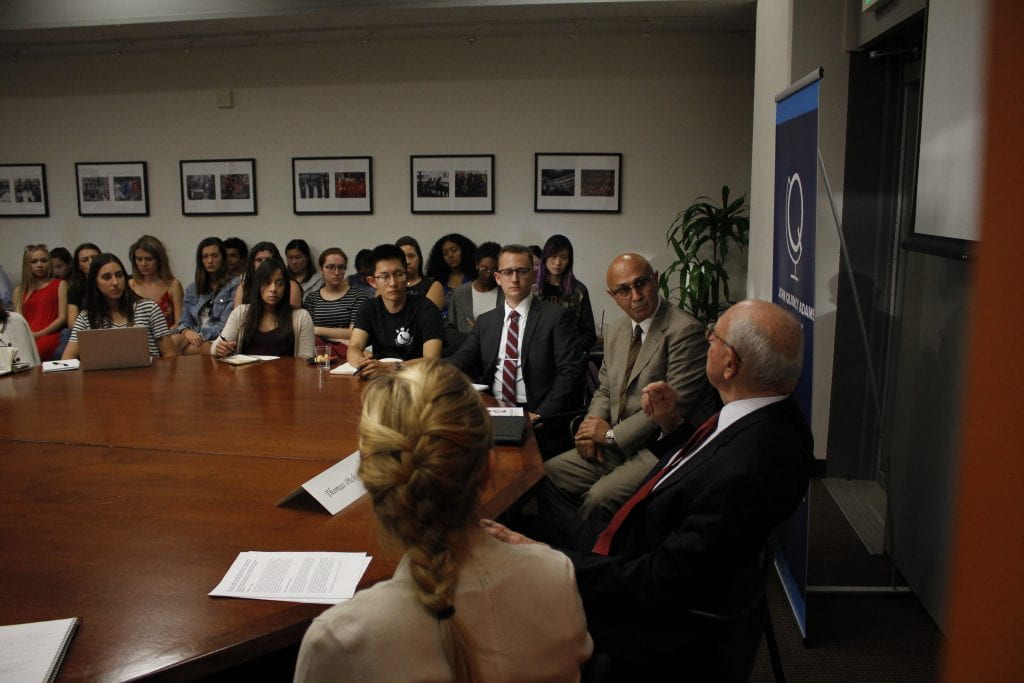In 2015, the U.S. and other world powers reached a deal with Iran to curb the country’s nuclear ambitions — but nine months into his presidency, President Donald Trump has repeatedly threatened to drop out of the agreement that was a hallmark of his predecessor’s legacy. On Oct. 25, Ambassador Thomas Pickering visited USC to speak about the future of this deal and the impact it has had on Iran, the U.S. and the world at large.
The event was hosted by the USC Annenberg Center on Communication Leadership & Policy in association with the USC Center on Public Diplomacy, the Association of Public Diplomacy Scholars and the John Quincy Adams Society. In his opening remarks, Pickering said that he wanted to inform the audience about Iran’s nuclear background and the 2015 agreement, but also to talk about how this policy might change in the future.
“I want to talk about where we are now, what might be some of the options ahead and where they might take us,” Pickering said.
Pickering, the former U.S. Ambassador to the United Nations under President Ronald Reagan, has held numerous political roles during his long tenure as a diplomat and public servant. He was the United States Under Secretary of State for Political Affairs from 1997 to 2000, and has served as the U.S. Ambassador to Russia, India, Israel, El Salvador, Nigeria and Jordan.
At the event, Pickering described the long road that led up to the deal, from the start of Iran’s nuclear program before the 1979 revolution to the country’s ongoing negotiations with the international community. Pickering explained that while Iran insisted it needed to have some nuclear capabilities in order to generate energy, the U.S. maintained a hard line against enrichment for many years.
“The western side, pushed by the United States, had a constant position that Iran should not enrich at all,” Pickering said. “That might have been easier to monitor, but would you have gotten Iran to agree to it?”
The Iran Nuclear Deal in its current form was signed in 2015 by Iran, the P5+1 (five permanent members of the United Nations Security Council, plus Germany) and the European Union. It lifted certain sanctions placed on the country in response to the proliferation of its nuclear program, in return for Iran scaling back its enrichment of plutonium and other materials to ensure that it could not develop nuclear weapons.
In the terms of the deal, Iran agreed to regular inspections of its nuclear facilities and has so far complied — but the deal still engendered significant controversy in the United States, with critics arguing that it offers too many concessions and isn’t severe enough. Trump was one such critic, tweeting on the campaign trail that “the Iran deal is terrible” and promising to renegotiate it. He decertified the deal in October, citing “multiple violations” from the Iranian side — though he stopped short of withdrawing the U.S. from it, saying he will try to fix its flaws instead.
“[Trump] was not very specific in what he outlined as his concerns, although others have done so,” Pickering said. “One set of concerns involves questions that Iran is engaging in activities never considered in the agreement — everything from human rights treatment to support for organizations that we and others consider to be terrorists, as well as Iran’s continuous testing of ballistic missiles.”
The Senate and the House of Representatives now have 60 days to decide whether they will re-institute the sanctions against Iran, Pickering said. This would violate the terms of the agreement from the U.S. side, but he added that Iran could simply decide to continue to abide by the agreement made with the other six parties (the remaining P5+1 nations and the EU).
Another possibility, however, was military enforcement of Iran’s scaled-back nuclear program — which Pickering said meant that conflict was not completely off the table. And in addition, Pickering pointed out, ending the deal might have consequences in other regions of the world — like North Korea, which has steadily been building up its nuclear capabilities in a way that the U.S. would hope to curb.
“If we’re serious about moving toward an agreement on the North Korean program, you can imagine how enamored they’d be after we just broke off a similar agreement with Iran,” Pickering said. “They would certainly argue there’s no basis they would have in trusting the U.S.”
